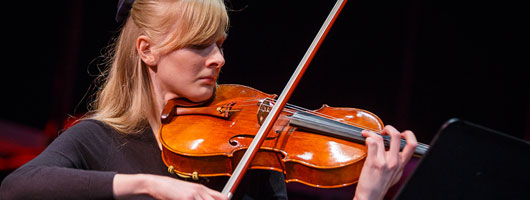 Music Degree Programs
Music Degree Programs
Graduate students with a bachelor’s degree in music from an accredited college or university or its demonstrated equivalent may undertake:
- Master of Music
- One of the special diploma programs
Admission
All preliminary inquiries about graduate study in music at IU South Bend are to be referred to the graduate admissions and retention office. Applications for admission to the Master of Music degree program are available online at https://www.iusb.edu/graduate-studies/index.php or from the Ernestine M. Raclin School of the Arts. Applicants must also submit official transcripts from all previous colleges and universities as well as the application fee.
Placement Examinations
After successfully completing an audition in the chosen performance area, and before beginning coursework on the Master of Music degree, each student will take graduate placement examinations in music history, theory, aural skills, keyboard skills, and diction (voice students only). If deficiencies are revealed, students will be required to complete one or more of the graduate-level review course(s) listed below before beginning the graduate curriculum. Credits earned for review courses do not count towards the degree. Prospective students may contact the director of graduate studies for general information about the format and content of these examinations.
Theory
This examination is based on the assumption that the candidate has had at least two years of undergraduate theory study. The examination includes topics in writing and analyzing of music from sixteenth century and eighteenth century counterpoint, diatonic and chromatic harmony, and twentieth century analysis techniques.
Students who fail any portion of the exam must enroll in the appropriate review course.
Music History
This examination comprises two parts. The first section covers music from the Ancient Greeks through the Baroque Period (up to 1750); the second convers music between the Classical period and WWII (1750-1945). Each portion focuses on the major composers, genres, musical developments, and ideologies that affected the development of music. The exam includes listening identification, short answer questions, and essays.
Note |: Students who fail all or part of this examination must enroll in MUS-M 541 Music History Review for Graduate Students I and/or MUS-M 542 Music History Review for Graduate Students II.
Graduate remedial courses in history, literature, and theory may be taken only twice. Failure in any of these remedial courses for the second time results in the student’s dismissal.
Keyboard and Aural Skills
The keyboard skills placement covers playing any major scale, two hands together, two octaves, playing a Roman numeral chord progression (in a major key to four sharps or flats) in left hand with melody in right hand, playing a chord progression alone first, then adding the melody, and sight-reading a four-part chorale or hymn.
The aural skills placement covers singing diatonic, chromatic, and atonal melodies, taking a dictation for two voices with Roman numeral and chord-quality recognition, and aural analysis.
Keyboard Proficiency
The keyboard examination is given at the end of each semester. Students who fail the examination must register in piano until the requirement is met.
Designed to ensure the student’s ability to use the piano as a tool within the framework of professional activities, the requirements vary according to level and area of music study. Students are to discuss specific requirements with their music advisors.
Other examinations pertaining to specific degrees may be required as appropriate.